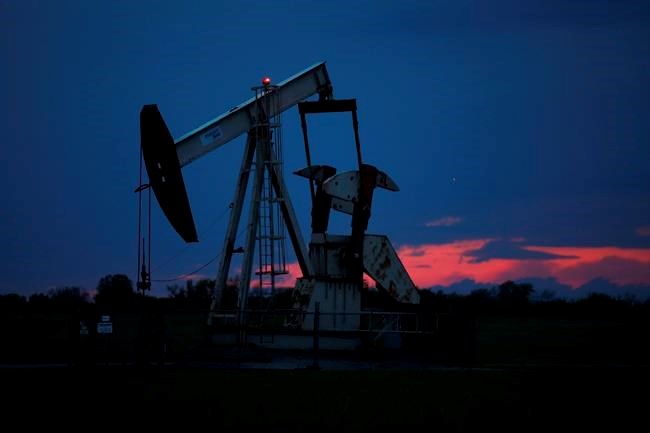CALGARY — Crude oil worth US$100 per barrel could be possible this winter, according to industry experts who have been watching prices rally this fall to territory not seen in seven years.
The North American benchmark West Texas Intermediate price spiked to US$78.38 in midday trading Monday before settling to close at US$77.61. Not only has oil fully rebounded from its 2020 pandemic lows, climbing by more than 50 per cent from the start of the year, it has also recovered from years of low prices before that.
"Prices are at the highest level since basically 2014, which was the initial big crash (that affected the industry)," said Rory Johnston, managing director and market economist at Toronto-based Price Street Inc. "We're definitely in bullish territory now."
Johnston said surging oil demand is occurring against the backdrop of a global commodities boom that has sent prices for everything from natural gas to steel skyrocketing. He said oil breaking the triple-digit threshold this winter is not at all out of the question, especially if the demand for jet fuel increases towards the holiday season.
"I do think it’s quite possible. And it’s going to depend a lot on the return of air travel," Johnston said. "The return of air travel is actually the biggest factor continuing to weigh on oil prices."
“As a producer, this is the best thing that’s happened in seven years," said Roger Tang, chief executive of Calgary-based Deltastream Energy Corp, a privately held oil and gas exploration company
"We’ve been going through a period of relatively volatile or very low oil prices, so seeing these prices coming back because of the supply and demand fundamentals — obviously, it's a welcome news."
Tang said his small company has already expanded both its head office and field staff and has plans to increase drilling in response to the positive pricing environment. He also said he expects prices to continue to rise to near-triple digit territory, at least.
"The question is, can you get there and how long can you hold at $100 a barrel? Once you get there, there's a lot of economic impact to the customers using oil and gas," Tang said. "It contributes to inflation, which can cause OPEC and non-OPEC producers to turn on the taps sooner. If they do that, you don't see $100 a barrel oil being sustainable for long."
Adam Legge, president and chief executive of the Business Council of Alberta, said he believes breaking the psychological threshold of $100 per barrel this winter "could very well be possible." But he said for Alberta, it won't be a return to the heady days of pre-2014, when the province's economy was awash with oil wealth.
"It will be a very different kind of environment, in the sense I don't think we'll see a massive return to hiring," Legge said. "Companies have become far more disciplined — they know they need to be leaner to be competitive."
Legge said the biggest impact will be felt at the drilling and services level.
"Drilling (companies) are busier now than they have been. In fact they’re at the point where they’re now hitting challenges finding labour to supply the growth," Legge said.
But he said the industry as a whole is not expected to embark on major capital expenditures or new projects. Instead, companies will likely use extra cash flow to pay down debt or invest in emissions reductions technology.
"It's not going to change the feel around the street that much. For example, we'll still have higher vacancy in the office side of things in downtown Calgary despite $100 oil," Legge said. "It's just not going back to that 'solve every problem by throwing money at it' kind of environment."
This report by The Canadian Press was first published Oct. 4, 2021.
Amanda Stephenson, The Canadian Press



